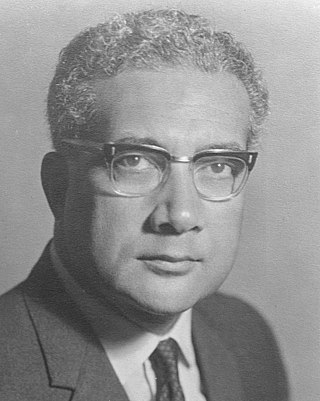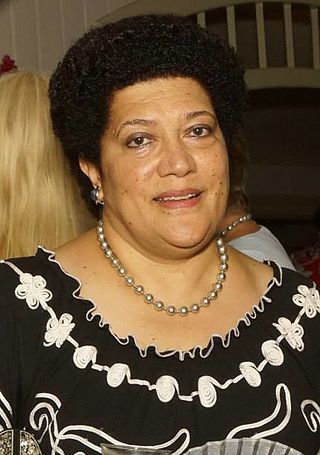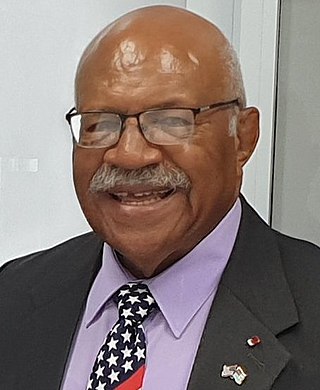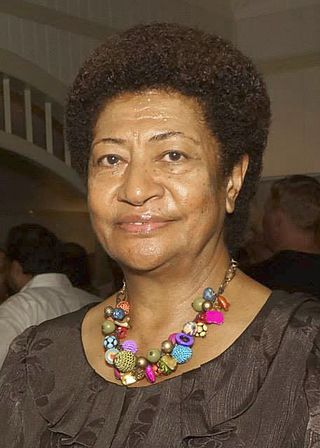Related Research Articles

Fiji, officially the Republic of Fiji, is an island country in Melanesia, part of Oceania in the South Pacific Ocean. It lies about 1,100 nautical miles north-northeast of New Zealand. Fiji consists of an archipelago of more than 330 islands—of which about 110 are permanently inhabited—and more than 500 islets, amounting to a total land area of about 18,300 square kilometres (7,100 sq mi). The most outlying island group is Ono-i-Lau. About 87% of the total population of 924,610 live on the two major islands, Viti Levu and Vanua Levu. About three-quarters of Fijians live on Viti Levu's coasts, either in the capital city of Suva, or in smaller urban centres such as Nadi or Lautoka. The interior of Viti Levu is sparsely inhabited because of its terrain.

The United Fiji Party was a political party in Fiji. It was founded in 2001 by Prime Minister Laisenia Qarase as a power base; it absorbed most of the Christian Democratic Alliance and other conservative groups, and its endorsement by the Great Council of Chiefs (Bose Levu Vakaturaga) caused it to be widely seen as the successor to the Alliance Party, the former ruling party that had dominated Fijian politics from the 1960s to the 1980s. It drew its support mainly from indigenous Fijiians.

RatuSir Kamisese Mara, was a Fijian politician, who served as Chief Minister from 1967 to 1970, when Fiji gained its independence from the United Kingdom, and, apart from one brief interruption in 1987, the first Prime Minister from 1970 to 1992. He subsequently served as president from 1993 to 2000.

Adi Koila Mara Nailatikau is a Fijian lawyer, who has served as a diplomat and politician. She was also First Lady of Fiji from 2009 until 2015, as the wife of Ratu Epeli Nailatikau, the President of Fiji.
Brigadier-General RatuEpeli Ganilau, MC, MSD, was a Fijian military officer and politician. His career previously encompassed such roles as Commander of the Fiji Military Forces and Chairman of the Bose Levu Vakaturaga. On 15 January 2007 he was sworn in as Minister for Fijian Affairs in the interim Cabinet formed in the wake of the 2006 Fijian coup d'état which deposed the Qarase government on 5 December 2006.

Sitiveni Ligamamada Rabuka is a Fijian politician, former soldier and former sportsman who has served as Prime Minister of Fiji since 24 December 2022. He was the instigator of two military coups in 1987. He was democratically elected as Prime Minister of Fiji, serving from 1992 to 1999, and again in 2022, leading a three-party coalition. He also served as Chairman of the Great Council of Chiefs from 1999 to 2001, and later as Chairman of the Cakaudrove Provincial Council from 2001 to 2008.
Fiji Week was a week of prayer meetings and multicultural programmes that took place the week of 4–11 October 2004. Organized at a cost of US$410,000 by a multiracial national committee chaired by the Prime Minister, Laisenia Qarase, Fiji Week was intended to foster reconciliation among Fiji's diverse ethnic communities, especially native Fijians and Indo-Fijians, whose mutual rivalry for political power has dominated Fijian politics for the last generation, and whose relationship has been especially strained since the overthrow of the Indo-Fijian-led government of Mahendra Chaudhry by ethnic Fijian nationalists in the Fiji coup of 2000. Organizers of Fiji Week hoped that it would help to bring about a sense of closure to those events, but the controversy that it generated made this appear difficult to achieve.
Sir James Michael Ah Koy,, is a Fijian businessman, politician, and diplomat. He is Executive Chairman of Kelton Investments, the IT service provider Datec Group Ltd., Honorary Consul of the Republic of Georgia to Fiji and a board director of forty-six companies. He served as a Cabinet Minister in the 1990s, and was a Senator from 2001 to 2006. He is Fiji's past ambassador to China. He served until December 2010, and was replaced by Esala Teleni.

The Soqosoqo ni Vakavulewa ni Taukei (SVT), occasionally known in English as Fijian Political Party, was a party which dominated the politics of Fiji in the 1990s and was the mainstay of coalition governments from 1992 to 1999.

The Fiji coup d'état of 2000 was a civilian coup d'état by hardline i-Taukei nationalists against the elected government of an Indo-Fijian Prime Minister, Mahendra Chaudhry on 19 May 2000. This was followed by an attempt on 27 May by President Ratu Sir Kamisese Mara to assert executive authority, and then by a military coup on 29 May by Republic of Fiji Military Forces Commander Commodore Frank Bainimarama. The coups resulted in the removal of the elected government and its replacement by an interim regime headed by Josefa Iloilo. In March 2001 the Court of Appeal of Fiji ruled that the coups and interim regime were illegal. An elected government was finally restored by the 2001 Fijian general election.

Two military mutinies took place in connection with the civilian coup d'état that occurred in Fiji in 2000, the first while the rebellion instigated by George Speight was in progress, and the second four months after it had ended.

RoTeimumu Vuikaba Kepa is a Fijian chief, former Member of the Parliament of Fiji, and former leader of the Social Democratic Liberal Party. She was the first Fijian woman to serve as Leader of the Opposition. She previously held the position of Deputy Prime Minister in the Qarase-led Soqosoqo Duavata ni Lewenivanua (SDL) government from 2001 to 2006. As the paramount chief of the Burebasaga Confederacy, she holds the title Roko Tui Dreketi.

In the early 2000s, Prime Minister Laisenia Qarase's government proposed legislation to establish a Commission with the power, subject to presidential approval, to pardon perpetrators and compensate victims of the coup d'état against the elected government of Mahendra Chaudhry in 2000. Most Fijian politicians outside of the government came out against proposed legislation Along with many politicians, the Military and a number of business and professional organizations also came out against the bill. The campaign derived its name from the yellow ribbons promoted by the opposition United Peoples Party and worn by many citizens, as a sign of their opposition to the legislation.

The controversial Reconciliation, Tolerance, and Unity Bill promoted by the Fijian government throughout 2005 generated enormous debate, both locally and internationally. The legislation aimed to establish a Commission empowered to compensate victims and pardon perpetrators of the coup d'état that deposed the elected government of Prime Minister Mahendra Chaudhry in May 2000. Support for the legislation came from Japan, while New Zealand opposed it. Australia, too, expressed strong reservations about the legislation, but also called on opponents of it, including the Military of Fiji, to show greater moderation. Non-governmental organizations in a number of countries took positions, also.

The Reconciliation and Unity Commission was a proposed government body to be set up if the Reconciliation, Tolerance, and Unity Bill, which was introduced into the Fijian Parliament on 4 May 2005 was passed. The legislation proposed to empower the commission to grant amnesty to perpetrators of the Fiji coup of 2000, and compensation to victims of it from 19 May 2000 through 15 March 2001. The Fijian President would retain a veto over the granting of amnesty.

The tension between Fiji's government and military forces, which had been simmering for more than two years, appeared to escalate in late December 2005. Tension between the government and the military had been simmering throughout the year, with Commodore Bainimarama and other military officers making strongly worded public statements opposing certain government policies, including the early release from prison of persons implicated in the Fiji coup of 2000, and the government's promotion of controversial legislation to establish a Commission with the power to grant amnesty to perpetrators of the coup.

The Fijian coup d'état of December 2006 was a coup d'état in Fiji carried out by Commodore Frank Bainimarama, Commander of the Republic of Fiji Military Forces (RFMF), against Prime Minister Laisenia Qarase and President Josefa Iloilo. It was the culmination of a political crisis that started the previous year, when the Qarase government introduced three bills to the Fijian Parliament. The Qoliqoli, Land Tribunal, and Reconciliation, Tolerance, and Unity Bills dealt with the ongoing ethnic conflicts in Fiji and the aftermath of the 2000 coup, and were considered to be pro-ethnic Fijian. Bainimarama presented the government with a list of demands on October 16 that included withdrawing the bills. Attempts at negotiation failed and the military launched the coup on 4 December. Parliament was dissolved, Qarase and his cabinet were dismissed, and some civilian officials were placed under house arrest. After the Great Council of Chiefs refused to appoint a cabinet friendly to the military, Bainimarama reached an understanding with Iloilo and reinstated him as President on 4 January 2007. Iloilo then appointed Bainimarama acting Prime Minister in charge of the Interim Cabinet.
Indo-Fijians, also known as Indian Fijians, are Fijian citizens of Indian descent, and include people who trace their ancestry to various regions of India and the Indian subcontinent. Although Indo-Fijians constituted a majority of Fiji's population from 1956 through the late 1980s, discrimination and the resulting brain drain resulted in them numbering 313,798 (37.6%) out of a total of 827,900 people living in Fiji as of 2007.
A series of events took place in the Pacific republic of Fiji in 2006, involving an ongoing public feud between the government and military. Tensions took a dramatic turn for the worse on 11–13 January, with reports of unusual troop and naval deployments, crisis meetings of the National Security Council, and the erection of police roadblocks. Rumours also swept the capital that the Military Commander, Commodore Frank Bainimarama, had been arrested by the police on government orders, but the Military denied this. The crisis came to a head on the 13th, with Bainimarama announcing that he had dismissed the Acting Land Force Commander, Lieutenant Colonel Jone Baledrokadroka for insubordination. This event was a precursor to the military coup that finally took place on 5 December 2006.

The majority of Fiji's islands were formed through volcanic activity starting around 150 million years ago. Today, some geothermic activity still occurs on the islands of Vanua Levu and Taveuni. Fiji was settled first by the Lapita culture, around 1,500–1,000 years BC, followed by a large influx of people with predominantly Melanesian genetics about the time of the beginning of the Common Era. Europeans visited Fiji from the 17th century, and, after a brief period as an independent kingdom, the British established the Colony of Fiji in 1874. Fiji was a Crown colony until 1970, when it gained independence as the Dominion of Fiji. A republic was declared in 1987, following a series of coups d'état.
References
- ↑ "Reconciliation in Vanua Levu over Fiji coup". Radio New Zealand International. Retrieved 28 June 2015.